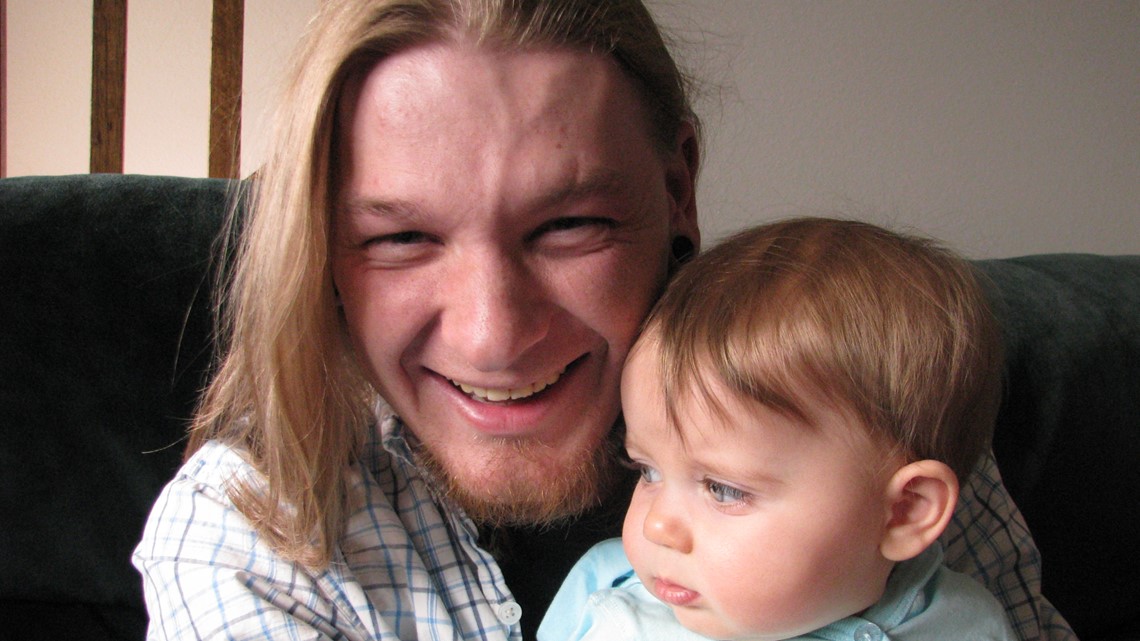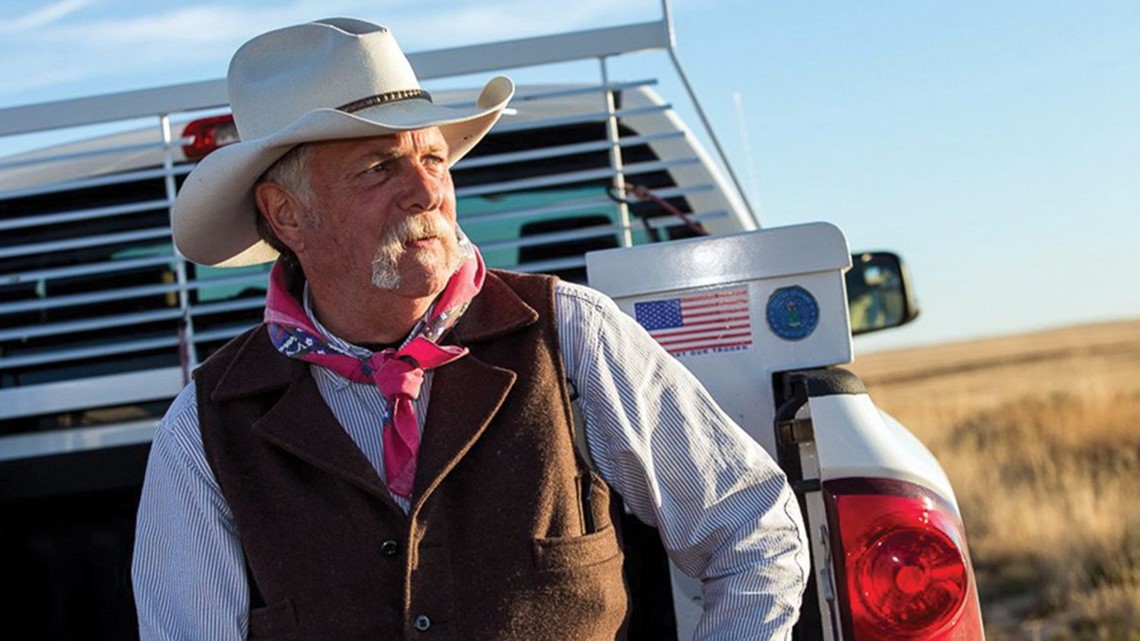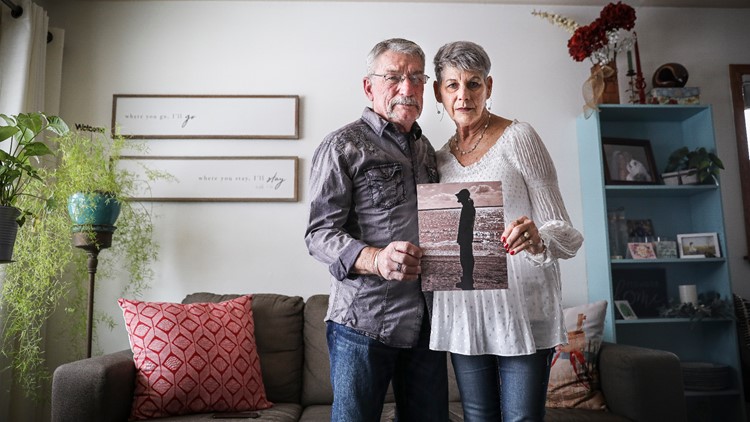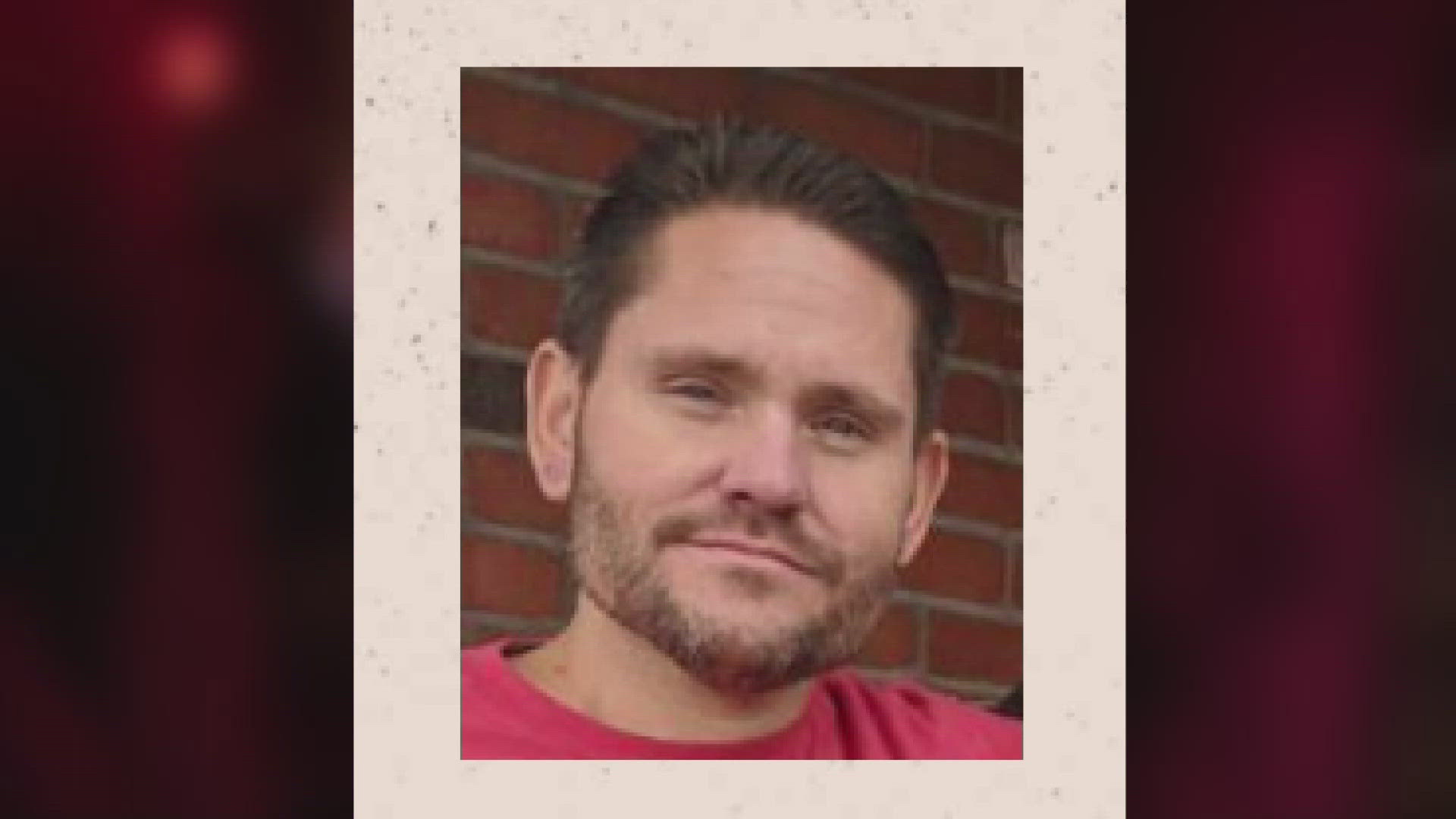KIOWA COUNTY, Colo. — Part Three
This is the third in a three-part series about an April 2020 police killing in eastern Colorado that has been shrouded in silence at a time of national and statewide uproar over excessive force. Read Part One here and Part Two here.
KIOWA COUNTY, Colo. – After Kiowa County Undersheriff Tracy Weisenhorn and Deputy Quinten Stump shot 39-year-old Zach Gifford to death following a traffic stop, their boss, Sheriff Casey Sheridan, put them on paid administrative leave.
RELATED: Three Bullets to the back: The striking silence around a police killing in small-town Colorado
The investigation began. The Prowers County Sheriff's Office and Colorado Bureau of Investigation worked jointly, with CBI investigators processing the scene and conducting officer interviews.
In May, while the investigation was still underway , Kiowa County residents called the local newspaper to say they'd spotted Weisenhorn wearing her uniform and driving a patrol car, and Stump, dressed in civilian clothes, wearing his badge on his belt and carrying a gun. Locals wondered how seriously Sheridan was taking the Gifford shooting.


In response to an inquiry, the sheriff’s office said the officers were following policy. That policy does not require officers to turn in their badges and guns while on paid administrative leave, unlike policies in many other departments statewide.
In August, two months after the investigation was completed but before the district attorney had decided whether to charge, Weisenhorn joined Sheridan and others on a trip to the annual motorcycle rally in Sturgis, South Dakota. Weisenhorn posted pictures of the trip on her Facebook page.
“Made it home from Sturgis. Had a great time. Best get away, with amazing friends,” she wrote on August 11 while posting 80 photos from the trip, including one of the sheriff.
The trip caused a stir among residents who were still in the dark about the outcome of the investigation. Sheridan has yet to answer questions about vacationing with his undersheriff while the criminality of her role in killing Gifford was still in question. As of this week, he also refuses to say if Weisenhorn remains on his staff.
Sheridan was not much more transparent about Stump‘s employment status. On Sept. 24, according to an official reprimand, the deputy was drunk and riding as a passenger in a car driven by his ex-girlfriend – a county social services case manager – when he fired two rounds at a highway sign with his duty-issued gun. The sheriff asked the state to investigate the incident and fired Stump when that probe was complete two months later. Yet he still refuses to talk about the former deputy, and both Stump and Weisenhorn have declined several requests for interviews.
In the meantime, the Kiowa County Commission has said nothing publicly about Stump or Weisenhorn, nor about Gifford’s killing in general. “They’ve been advised. They don’t feel comfortable,” said county administrator Tina Adamson. Gifford’s death, she added, is “a subject matter we know very little about,” she said on March 5.
By that point, the 57-page affidavit describing what happened had been available upon request for almost two months.
George Floyd’s killing in Minneapolis and Elijah McClain’s killing in Aurora, both at the hands of police, prompted protests nationally and in cities and towns throughout Colorado. Following uproar about police excessive force, Colorado’s General Assembly passed sweeping police reform legislation that bans officers from using deadly force against those suspected of minor or non-violent offenses and requires officers to intervene if they witness another officer doing so. The legislation also makes police officers who violate people's civil rights personally responsible in state court.
Those measures passed two months after Gifford’s killing and won’t go into effect until 2023.
Why the Silence?
News of Gifford’s killing hit like a bomb, threatening the identity of a county that prides itself on being small and quiet, without big-city problems. Most community members had no experience, no frame of reference on how to react, if at all.
“A lot of people talk about it – just not very loudly,” says Shoni McKnight, Gifford’s neighbor.


Some of Gifford’s friends considered staging a protest immediately after the shooting, but the pandemic held them off.
“And then the whole thing with George Floyd happened and it was like … everywhere,” says Gifford’s buddy Jamie Crockett. “And we didn’t want to have (our protest) be swept up in all that anger and hatred. And we knew it would be.”
Doris Lessenden was Gifford’s former art teacher and neighbor. She withheld judgement about the shooting until learning about the three shots to his back. “Of course, I am angry,” she says, quick to distinguish that feeling from the Black Lives Matter protests she sees on TV.
“It’s kind of low-class behavior to me.”
“I think that the people in our community are more solid, more unradical, if that’s a word, than to do that. We feel that there will be justice, and God has a plan in this, and we don’t know what that plan is and we will all have to suffer some kind of persecution,” she says.
“I’ve tried not to write or say anything, although I know what’s in my heart and my emotions. I shouldn’t even talk about it.”
Jimmy Brown, the local funeral home director and elected county coroner, often wonders how a traffic stop in tiny Brandon escalated to a homicide. But, he has chosen to hold his tongue. “I gotta be very cautious because I (don’t) want to comingle my personal feelings with my professional duties.”
Gifford’s friend Josh Brown (no relation to Jimmy) attributes his silence to intimidation from Sheridan. “Nobody here will talk about it, afraid … of backlash from the sheriff’s department,” he says of Gifford’s killing. “It’s illegal to have a voice in Kiowa County, to tell you the truth. … They need to be investigated.”
Some locals also express discomfort about speaking out in a small community or pointing the finger at a sheriff who is also a neighbor, the father with a child in school and a nephew who bags groceries at the market, the guy who hunts and rides motorcycles with some of your friends or delights your kids by driving his squad car down Maine Street with the lights on and the siren going, leading the bus carrying the football team to state.
“There’s a mentality to people on the Eastern Plains. We’re the kind of people who want to wait and watch,” says Joe Shields, Eads’ mayor. “If someone makes a mistake or does something wrong, we don’t call them out for what they’ve done.”
There has been one persistent exception in town to this unspoken rule: Jeff Campbell, a prolific writer of letters to the editor who single-handedly has tried to keep Gifford’s death in the public spotlight.
Campbell, 70, is a retired police officer and investigator who is a municipal judge in Eads. He has lived in town for 18 years, which, he knows, still makes him an outsider, yet also more comfortable asking hard questions.
He said he hired Gifford for a repair job years ago and rehired him several times for others around his house and property. “He did what he said he’d do, never deceived me and never hesitated to re-do something he hadn’t done (right). In all the times I encountered him, I never saw a streak that caused me to hesitate because I thought he was sideways or violent,” he wrote in a letter to the editor of the Kiowa County Independent about two weeks after Gifford’s killing.


Quick to note that his interest in the case is personal, unrelated to his municipal judge duties, Campbell has continued writing about it every week since. He drew on his law enforcement experience to explain typical police standards and procedures and tell readers what to expect in terms of transparency and accountability around the investigation and charging decisions.
“In four weeks since mid-afternoon April 9, 2020, when Zach Gifford was shot and killed in Brandon I don’t recall any press briefings from Kiowa or Prowers County. What’s happening? The longer we wait, the more questions and doubts arise. The longer we wait, the fouler the smell,” Campbell wrote on May 6.
When no arrests had been made, charges filed, or court dates set in the case by June, he wrote that he was “not alone” and that “scores” of frustrated people had spoken to him about what seemed to be authorities’ inaction. He wrote of the uneasiness in the community, of fear of the police, of the 'Blue Code' that protects bad officers.
As with the Army’s 19th Century massacre of Arapahoe and Cheyenne people in nearby Sand Creek, he wrote in another letter, “... ‘good men’ must have taken an active part or looked away.”
“You all need to stand,” he implored his fellow residents in a Feb. 25 letter. “You know how. I pray you all will.”
But no one has.
Publicly criticizing the sheriff or district attorney would be a losing cause in one of Colorado’s most politically conservative communities, rancher Laura Negley says. “You won’t find a more pro-law enforcement county than Kiowa County.”
She also sees the community’s silence – and her own – as a sign of deference to Gifford’s parents.
“Larry and Carla are not agitators. They are peace lovers. Maybe we’re waiting for someone in the family to say ‘We are hurting. They are hurting us horribly.’”
Hurting
The Giffords are hurting.
Their son was shot to death by law enforcement they trusted in a community they had believed to be safe.
For nine months, they didn’t know some of the most basic things about what happened. Things like that Stump patted their son down before shooting him, and that Weisenhorn handcuffed him after. And so they made calls, maddening ones, begging for information from Kiowa County officials who didn’t call back, let alone send condolences about their son’s death. In the Giffords’ minds, the run-around that some government agencies require, the obfuscation with which some officials handle information went from bureaucracy to cruelty. And so they stopped even trying to ask.


Twelve days into 2021, the couple got word that Stump had been arrested. He is free on $100,000 bond. Carla Gifford tried reading the affidavit accompanying his arrest warrant, but needed to stop, and Larry Gifford waded into it, night after night, absorbing its details. They both say it manages all at once to spell out what happened to their son, yet explain nothing really at all.
Two weeks later came a five-page court document filed by DA Josh Vogel charging Stump with the three felony counts, each carrying a sentencing range of 10 to 32 years. A trial, if there is one, could be months away or longer.
There is no official tally of how many Colorado law enforcement officers have been criminally prosecuted for killing people on duty. But charges are rare enough that an informal survey of officers, lawyers, scholars, civil rights advocates and watchdogs throughout the state came up with five cases statewide since 2000. Most did not result in convictions.
The Giffords and others say they do not understand why the murder charges against Stump are second- rather than first-degree, and why they’re preceded by the word attempt. “Zach is not attempted dead,” the say. He is dead. The charges seem like a slap on the wrist, the couple and many residents interviewed for this story say.
The family wants to know why Weisenhorn isn’t also being charged, especially when she was the one who made the traffic stop, the one who tasered their son first and also fired twice, including the first shot.
“That was our son. I just feel like things were not done properly,” Carla says. “This is a situation where you think you know people, then something happens like this, and you realize you don’t.”
Tired of non-answers from the county, the Giffords hired John Holland, a Denver-based civil rights lawyer in February. In a 12-page letter to county commissioners, Holland wrote that Gifford had been patted down long enough for Stump and Weisenhorn to know he was not carrying a gun. He cited a U.S. Supreme Court ruling that law enforcement officers may not use deadly force on a fleeing suspect who is not posing “a threat of serious physical harm” to officers or to others. The county’s failure to discipline Weisenhorn or Stump for the shooting, he added, indicates “that the Sheriff approved of the conduct and the basis for it.”
Holland wrote that the county is liable for Gifford’s death.
He says he hopes to meet with county commissioners soon to pose questions that have gone unanswered too long.
Questions like “Where is the justice for Zach?” Larry says.
And, as Carla puts it, “Where is the outcry?”
This story is brought to you by COLab, the Colorado News Collaborative, a coalition of more than 100 news outlets.
SUGGESTED VIDEOS: Local stories from 9NEWS



